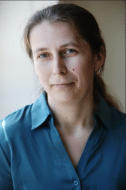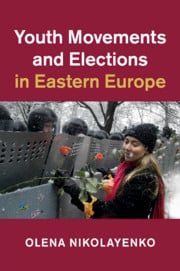
Olena Nikolayenko
Professor and Chair of the Department of Political Science, Fordham University and Member of the Board of Directors, The Shevchenko Scientific Society in the United States

My current book project, tentatively titled Invisible Revolutionaries: Women’s Participation in the 2013-2014 Revolution of Dignity in Ukraine, highlights the role of women during the Revolution of Dignity, also known as the EuroMaidan. The project seeks to answer three interrelated questions: (1) Why did women participate in the revolution?; (2) Which roles did women assume over the course of mass mobilization?; and (3) What were gender outcomes of the revolution? Some of the findings from this project have appeared in Comparative Politics and Slavic Review.
Russia’s unconscionable invasion of Ukraine took a heavy toll on the country. Specifically, Russia’s indiscriminate bombing of civilian infrastructure resulted in the destruction of university buildings, disruption of academic activities, and deaths of civilians, including students, faculty, and staff. Among Ukrainian scientists killed by the Russian armed forces were Andriy Kravchenko, a 41-year-old researcher at the Chuiko Institute of Surface Chemistry, Oleksandr Kysliuk, a 60-year-old professor of Latin and Roman law at the Drahomanov National Pedagogical University, and Yulia Zdanovska, a 21-year-old Teach for Ukraine volunteer and a silver medalist at the 2017 European Girls’ Mathematical Olympiad. These tragic human losses have a profound impact on Ukrainian society and the education system.

There are numerous ways in which U.S. institutions can provide support for Ukrainian scholars affected by the war. First, U.S. institutions can organize a series of virtual and in-person public events in the fall of 2022 and invite Ukrainian scholars as guest speakers. Given the passage of time since the onset of Russia’s full-scale invasion of Ukraine and the approach of midterm elections, the general public appears to have lost interest in the war. Ukraine still needs a great deal of Western support to fight against the world’s second strongest military. Second, research centers can offer non-residential fellowships for Ukrainian scholars to remain active in academia. In addition, U.S. institutions can offer free learning opportunities for Ukrainian students. For example, the consortium of leading Ukrainian educational institutions and organizations launched The Ukrainian Global University to facilitate access to various study and research opportunities for Ukrainian students and scholars.
My hope is that U.S. academic institutions will broaden the scope of their programming and invest more resources into the development of Ukrainian Studies and the cultivation of partnerships with Ukrainian universities in the wake of the war. Programs in East European Studies, for example, might consider offering a wider range of Slavic literature and culture courses to highlight outstanding literary works by Ukrainian writers and poets. Furthermore, it is important to examine political processes in Eastern Europe from multiple perspectives rather than through a Russian lens.